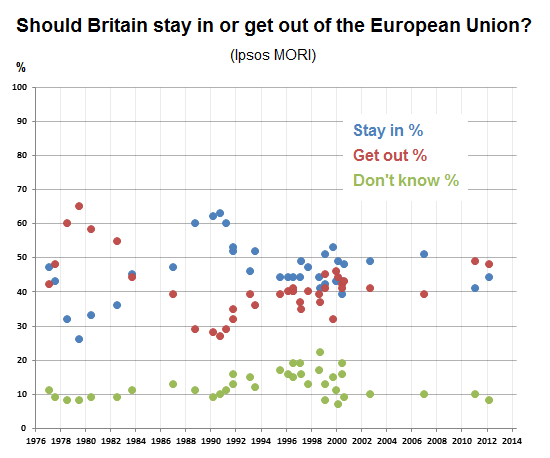The European Union: some facts
Why does EU membership matter?
- It's estimated (although the source is murky) that 3.5m jobs are associated with EU membership. That's not to say those jobs are dependent on EU membership.
- About half of UK exports are to other EU countries, although we are a net importer from the EU. [Correction: Originally we wrongly said the UK is a net exporter to the EU. That is true of services alone, but when you take into account goods and services, we are a net importer].
- The UK is a net contributor to the EU budget, but governments have estimated that the financial benefits of membership in terms of trade and employment outweigh this cost, as the House of Common Library explains.
- The EU has a significant impact on UK law. Attempts to put a number on this are probably best left alone. Estimates of the proportion of UK laws that originate in Brussels range anywhere from 7% to 75% depending on what you count and when. However, these estimates alone can't quantify the importance of the laws involved.
Public Attitudes
According to its own polling…
- The EU is not much loved by anyone. When asked what the EU means to you personally, the third most popular response is 'waste of money'. Freedom to travel, study and work top the list, followed by the Euro, waste, peace and bureaucracy.
- People in the UK know less about than EU than most. The UK has the lowest scores for answering some factual questions about the EU, like how many states are members and whether Switzerland is one. 53% of us got three questions right, compared to 80% of Greeks and 63% on average across Europe.
- And we like it less than the majority. 'Waste of money' is the top response to what the EU means to you personally at 31%, with 'bureaucracy' in joint second along with freedom to travel, study and work, both at 27%.
People in the UK:
- We're in two minds about staying in the EU. The same poll can show a majority for both staying in the EU and getting out (while maintaining close trading links).
- At the moment a majority of Brits are in favour of us leaving the EU. In the past sometimes staying in has been in the lead, but the gap between the two has often been smallish. See the IPSOS MORI data graphed below.
- We have an appetite for renegotiation. YouGov reports that we'd vote 3:2 to stay in the EU after a renegotiation.
- We do not name the European Union as one of the biggest issues facing Britain today. Only 1% think it's the biggest, and 7% think it's one of the most important. The economy, immigration and unemployment lead the list.

Selected sources
House of Commons Library briefing papers on the European Union, including:
- On referendums and renegotiations: The UK and Europe: time for a new relationship? (Sep 2012)
- UK-EU Economic Relations — Key Statistics (Feb 2013)
- Compendium of polls: UK Public Opinion on the European Union (Apr 2012)
- Eurobarometer 78 (Autumn 2012) Public Opinion in the European Union (the EU's official polling)
- Ipsos MORI Compendium of polls about staying in or getting out of the EU/Common Market, 1977-2012
- YouGov frequent polling on how people would vote in an EU referendum 2011-2013